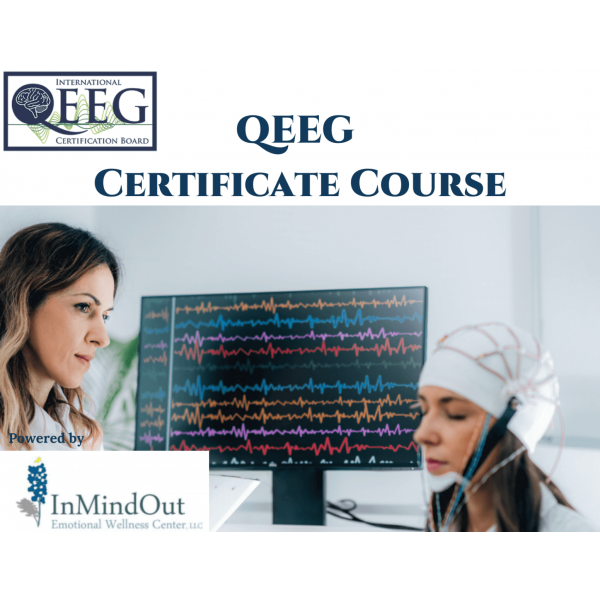We use cookies to make your experience better. To comply with the new e-Privacy directive, we need to ask for your consent to set the cookies. Learn more.
40 Hour IQCB QEEG Certificate Course
- Online Only & Hybrid Options Available
- Learn about EEG signal patterns
- Understand qEEG assessments and data
- 40 hours of APA Continuing Education Credit Available
Our Part #
SUP BCIA-QEEG
In Stock
Only %1 left
As low as
$1,295.00
The InMindOut QEEG Certificate Course is delivered in two phases. Our hybrid learning model allows you to work at your own pace online for phase I and then join us for phase II which is two days of hands-on practical learning in person. This course is approved by the American Psychological Association and the International QEEG Certification Board (IQCB) and meets the requirements for professionals seeking board certification.
Check out our calendar of events for the upcoming in-person dates.
By the conclusion of this course, participants will be able to:
- Explain the uses for qEEG assessments and resulting data
- List the definitions associated with the latest empirical qEEG research
- Explain the therapeutic relationship between the qEEG practitioner and client
- Demonstrate qEEG techniques necessary to pass the IQCB exam
- List and define terms associated with signal processing
- Describe the qEEG intake process including collection of medical history, psychological conditions, medications, psychosocial and family history, and relevant biographical information, etc.
- Describe how qEEG services should be limited to the practice standards and guidelines of one’s license or the license of their supervisor and also to those areas where one has: sufficient training and familiarity with the client population and disorders
- Describe the ethical and professional conduct of practitioners expected by the IQCB
- Explain basic neurophysiology and the connection to qEEG
- Explain basic neuroanatomy and the connection to qEEG
- Explain how the EEG signal is acquired
- Describe the non-electrical equipment involved in qEEG
- Describe the electronic systems involved in qEEG
- Explain the comparison between qEEG and other neuroimaging techniques
- Describe montages and their characteristics associated with qEEG
- Explain and recognize abnormal EEG patterns
- Explain and recognize normal EEG patterns
- List the psychopharmacological considerations when practicing qEEG
- Explain client rights associated with privacy, confidentiality, privileged communication, informed consent to assessment and treatment, treatment contract apprising of possible adverse effects, accepting clients, abandonment, and appropriate referrals, equal access to health care, and HIPAA compliance
- Explain the purposes and process of supervision and consultation in qEEG practices
- Describe the purposes and process of mentoring in qEEG practices
- Define professional relationships in qEEG practices including: dual relationships, conflicts of interest and exploitation of clients, consultations, referrals, and relationships with other professionals, medical and medication monitoring, procedures for dealing with unethical behavior and consumer complaints
- Explain the current trends in qEEG software and equipment
- Demonstrate qEEG assessment protocols and implementation of qEEG assessments in treatment
- Demonstrate how to edit raw EEG and artifacts
- Explain database criteria and how to choose the best database for subject inclusion/exclusion
- Explain the fundamental statistical considerations within databases
- Describe Z-score measures
- Demonstrate how to generate and interpret topographic and spectral maps
- Explain the sources of brain activity and which frequency bands normally emanate
- Describe developmental changes in the EEG
- List which EEG signatures should be referred out to other professionals
- Explain how Brodmann area functions and network connections are related to qEEG practices
- Describe the general cognitive and clinical changes that take effect after neurofeedback training based on publications
- Explain how clinical presentation may affect the EEG
SPECIAL TERMS AND CONDITIONS OF SALE ON EDUCATIONAL COURSES
- No refunds.
- Online access is available for 6 months from purchase date.
- Hybrid/In-person dates changes. Attendance dates may be changed up to 30 days prior to the scheduled course start date. Any changes less than 30 days from the course start date will require an additional fee of $395. No Exceptions.
- You may upgrade your Online course to Hybrid (online/in-person) for an additional fee of $495.
Write Your Own Review


